(人教版)必修5 Unit 4 Making the news 倒装及练习
文档属性
| 名称 | (人教版)必修5 Unit 4 Making the news 倒装及练习 |
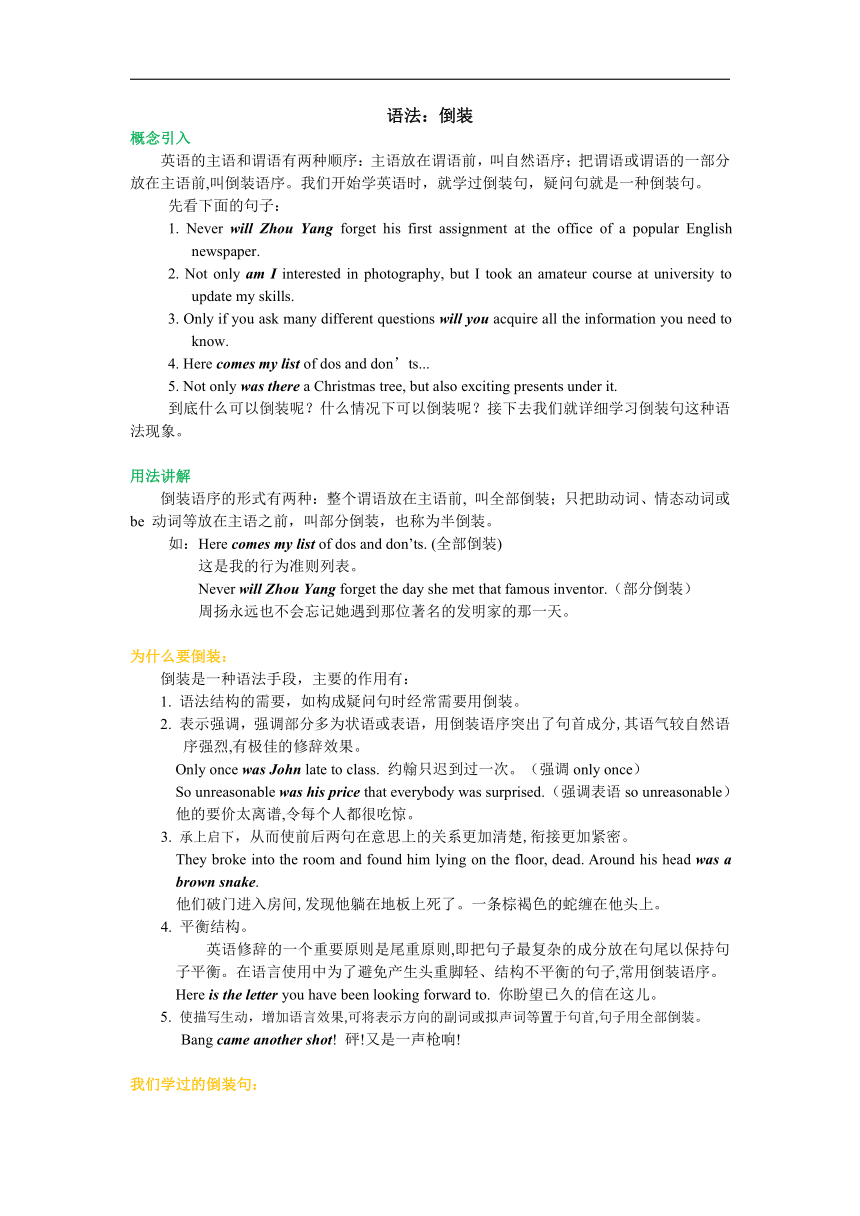
|
|
| 格式 | zip | ||
| 文件大小 | 40.0KB | ||
| 资源类型 | 教案 | ||
| 版本资源 | 人教版(新课程标准) | ||
| 科目 | 英语 | ||
| 更新时间 | 2019-08-01 16:08:58 | ||
图片预览

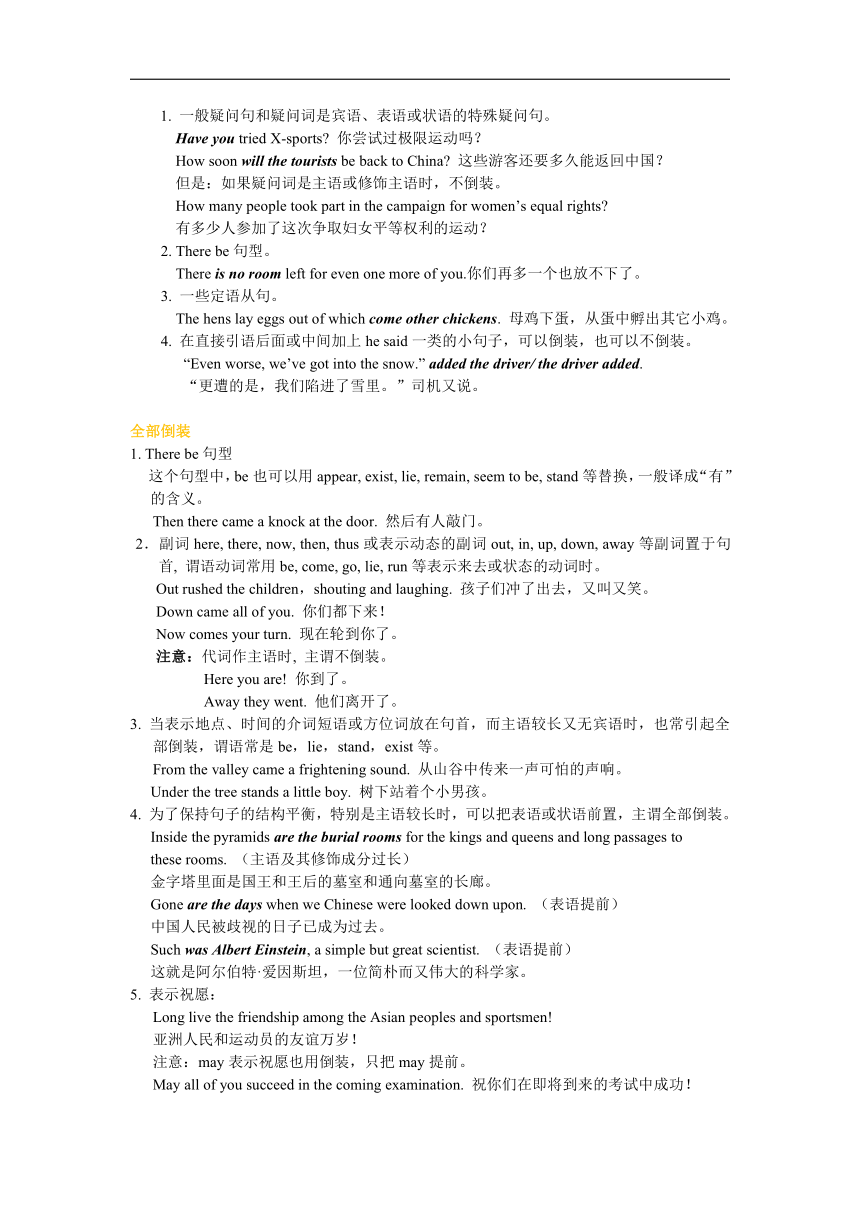
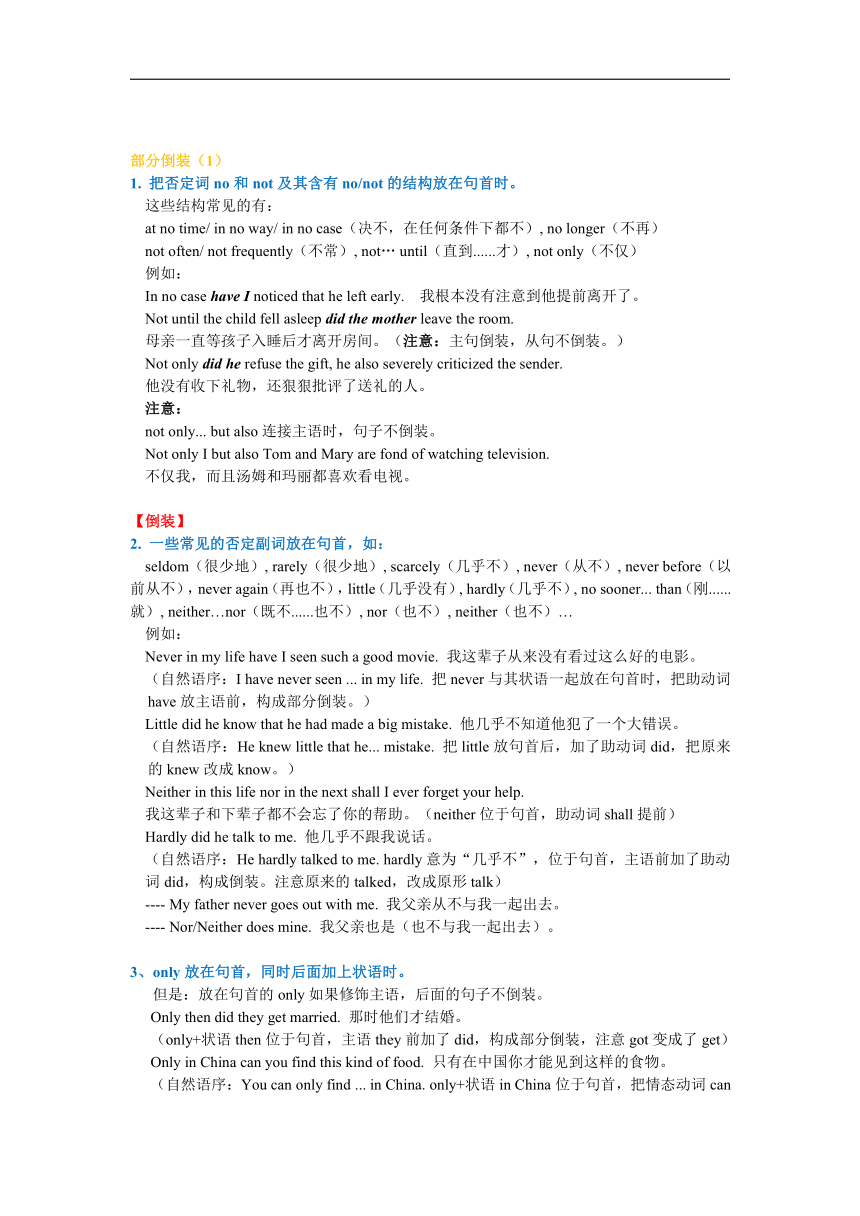
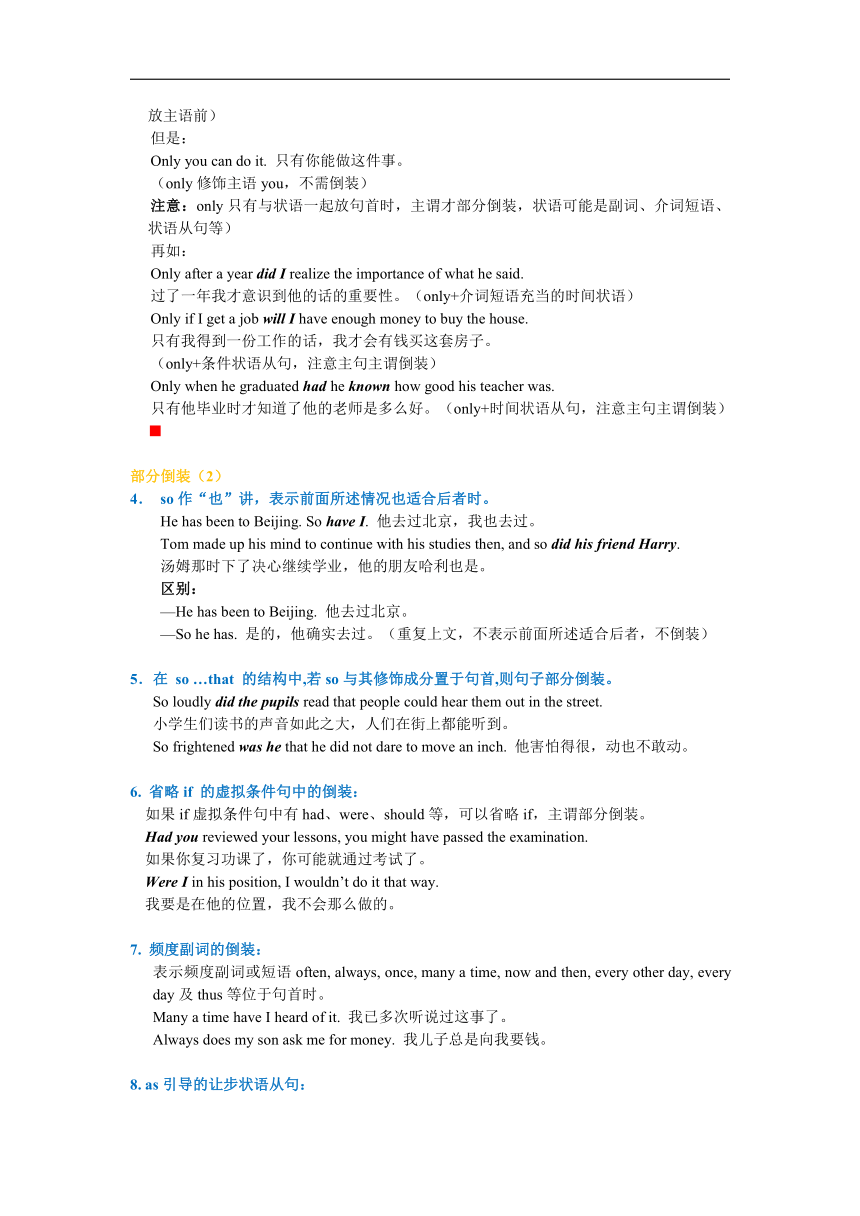
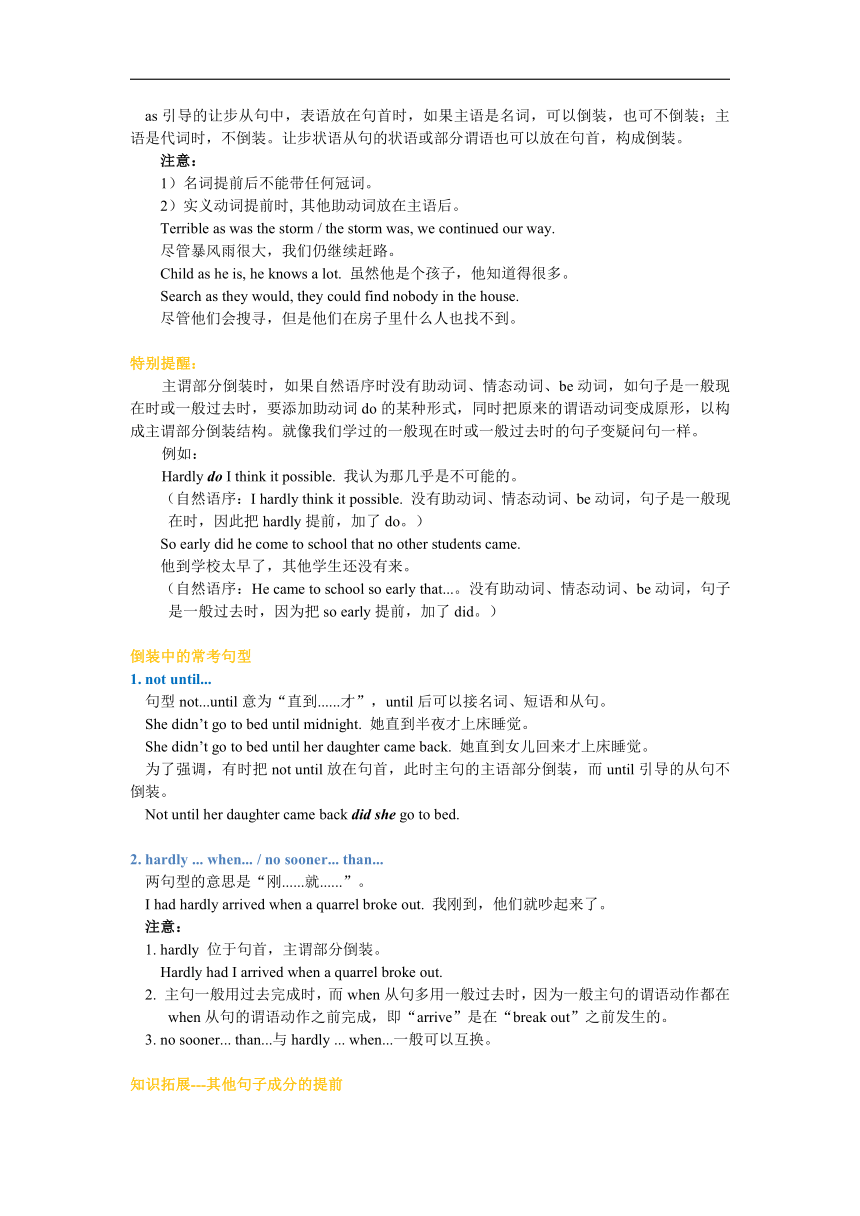
文档简介
语法:倒装
概念引入
英语的主语和谓语有两种顺序:主语放在谓语前,叫自然语序;把谓语或谓语的一部分放在主语前,叫倒装语序。我们开始学英语时,就学过倒装句,疑问句就是一种倒装句。
先看下面的句子:
1. Never will Zhou Yang forget his first assignment at the office of a popular English newspaper.
2. Not only am I interested in photography, but I took an amateur course at university to update my skills.
3. Only if you ask many different questions will you acquire all the information you need to know.
4. Here comes my list of dos and don’ts...
5. Not only was there a Christmas tree, but also exciting presents under it.
到底什么可以倒装呢?什么情况下可以倒装呢?接下去我们就详细学习倒装句这种语法现象。
用法讲解
倒装语序的形式有两种:整个谓语放在主语前, 叫全部倒装;只把助动词、情态动词或be 动词等放在主语之前,叫部分倒装,也称为半倒装。
如:Here comes my list of dos and don’ts. (全部倒装)
这是我的行为准则列表。
Never will Zhou Yang forget the day she met that famous inventor.(部分倒装)
周扬永远也不会忘记她遇到那位著名的发明家的那一天。
为什么要倒装:
倒装是一种语法手段,主要的作用有:
1. 语法结构的需要,如构成疑问句时经常需要用倒装。
2. 表示强调,强调部分多为状语或表语,用倒装语序突出了句首成分,其语气较自然语序强烈,有极佳的修辞效果。
Only once was John late to class. 约翰只迟到过一次。(强调only once)
So unreasonable was his price that everybody was surprised. (强调表语so unreasonable)
他的要价太离谱,令每个人都很吃惊。
3. 承上启下,从而使前后两句在意思上的关系更加清楚,衔接更加紧密。
They broke into the room and found him lying on the floor, dead. Around his head was a brown snake.
他们破门进入房间,发现他躺在地板上死了。一条棕褐色的蛇缠在他头上。
4. 平衡结构。
英语修辞的一个重要原则是尾重原则,即把句子最复杂的成分放在句尾以保持句子平衡。在语言使用中为了避免产生头重脚轻、结构不平衡的句子,常用倒装语序。
Here is the letter you have been looking forward to. 你盼望已久的信在这儿。
5. 使描写生动,增加语言效果,可将表示方向的副词或拟声词等置于句首,句子用全部倒装。
Bang came another shot! 砰!又是一声枪响!
我们学过的倒装句:
1. 一般疑问句和疑问词是宾语、表语或状语的特殊疑问句。
Have you tried X-sports? 你尝试过极限运动吗?
How soon will the tourists be back to China? 这些游客还要多久能返回中国?
但是:如果疑问词是主语或修饰主语时,不倒装。
How many people took part in the campaign for women’s equal rights?
有多少人参加了这次争取妇女平等权利的运动?
2. There be句型。
There is no room left for even one more of you.你们再多一个也放不下了。
3. 一些定语从句。
The hens lay eggs out of which come other chickens. 母鸡下蛋,从蛋中孵出其它小鸡。
4. 在直接引语后面或中间加上he said一类的小句子,可以倒装,也可以不倒装。
“Even worse, we’ve got into the snow.” added the driver/ the driver added.
“更遭的是,我们陷进了雪里。”司机又说。
全部倒装
1. There be句型
这个句型中,be也可以用appear, exist, lie, remain, seem to be, stand等替换,一般译成“有”的含义。
Then there came a knock at the door. 然后有人敲门。
2.副词here, there, now, then, thus或表示动态的副词out, in, up, down, away等副词置于句首, 谓语动词常用be, come, go, lie, run等表示来去或状态的动词时。
Out rushed the children,shouting and laughing. 孩子们冲了出去,又叫又笑。
Down came all of you. 你们都下来!
Now comes your turn. 现在轮到你了。
注意:代词作主语时, 主谓不倒装。
Here you are! 你到了。
Away they went. 他们离开了。
3. 当表示地点、时间的介词短语或方位词放在句首,而主语较长又无宾语时,也常引起全部倒装,谓语常是be,lie,stand,exist等。
From the valley came a frightening sound. 从山谷中传来一声可怕的声响。
Under the tree stands a little boy. 树下站着个小男孩。
4. 为了保持句子的结构平衡,特别是主语较长时,可以把表语或状语前置,主谓全部倒装。
Inside the pyramids are the burial rooms for the kings and queens and long passages to
these rooms. (主语及其修饰成分过长)
金字塔里面是国王和王后的墓室和通向墓室的长廊。
Gone are the days when we Chinese were looked down upon. (表语提前)
中国人民被歧视的日子已成为过去。
Such was Albert Einstein, a simple but great scientist. (表语提前)
这就是阿尔伯特·爱因斯坦,一位简朴而又伟大的科学家。
5. 表示祝愿:
Long live the friendship among the Asian peoples and sportsmen!
亚洲人民和运动员的友谊万岁!
注意:may表示祝愿也用倒装,只把may提前。
May all of you succeed in the coming examination. 祝你们在即将到来的考试中成功!
部分倒装(1)
1. 把否定词no和not及其含有no/not的结构放在句首时。
这些结构常见的有:
at no time/ in no way/ in no case(决不,在任何条件下都不), no longer(不再)
not often/ not frequently(不常), not… until(直到......才), not only(不仅)
例如:
In no case have I noticed that he left early. 我根本没有注意到他提前离开了。
Not until the child fell asleep did the mother leave the room.
母亲一直等孩子入睡后才离开房间。(注意:主句倒装,从句不倒装。)
Not only did he refuse the gift, he also severely criticized the sender.
他没有收下礼物,还狠狠批评了送礼的人。
注意:
not only... but also连接主语时,句子不倒装。
Not only I but also Tom and Mary are fond of watching television.
不仅我,而且汤姆和玛丽都喜欢看电视。
【倒装】
2. 一些常见的否定副词放在句首,如:
seldom(很少地), rarely(很少地), scarcely(几乎不), never(从不), never before(以前从不),never again(再也不),little(几乎没有), hardly(几乎不), no sooner... than(刚......就), neither…nor(既不......也不), nor(也不), neither(也不)…
例如:
Never in my life have I seen such a good movie. 我这辈子从来没有看过这么好的电影。
(自然语序:I have never seen ... in my life. 把never与其状语一起放在句首时,把助动词have放主语前,构成部分倒装。)
Little did he know that he had made a big mistake. 他几乎不知道他犯了一个大错误。
(自然语序:He knew little that he... mistake. 把little放句首后,加了助动词did,把原来的knew改成know。)
Neither in this life nor in the next shall I ever forget your help.
我这辈子和下辈子都不会忘了你的帮助。(neither位于句首,助动词shall提前)
Hardly did he talk to me. 他几乎不跟我说话。
(自然语序:He hardly talked to me. hardly意为“几乎不”,位于句首,主语前加了助动词did,构成倒装。注意原来的talked,改成原形talk)
---- My father never goes out with me. 我父亲从不与我一起出去。
---- Nor/Neither does mine. 我父亲也是(也不与我一起出去)。
3、only放在句首,同时后面加上状语时。
但是:放在句首的only如果修饰主语,后面的句子不倒装。
Only then did they get married. 那时他们才结婚。
(only+状语then位于句首,主语they前加了did,构成部分倒装,注意got变成了get)
Only in China can you find this kind of food. 只有在中国你才能见到这样的食物。
(自然语序:You can only find ... in China. only+状语in China位于句首,把情态动词can放主语前)
但是:
Only you can do it. 只有你能做这件事。
(only修饰主语you,不需倒装)
注意:only只有与状语一起放句首时,主谓才部分倒装,状语可能是副词、介词短语、状语从句等)
再如:
Only after a year did I realize the importance of what he said.
过了一年我才意识到他的话的重要性。(only+介词短语充当的时间状语)
Only if I get a job will I have enough money to buy the house.
只有我得到一份工作的话,我才会有钱买这套房子。
(only+条件状语从句,注意主句主谓倒装)
Only when he graduated had he known how good his teacher was.
只有他毕业时才知道了他的老师是多么好。(only+时间状语从句,注意主句主谓倒装)■
部分倒装(2)
4. so作“也”讲,表示前面所述情况也适合后者时。
He has been to Beijing. So have I. 他去过北京,我也去过。
Tom made up his mind to continue with his studies then, and so did his friend Harry.
汤姆那时下了决心继续学业,他的朋友哈利也是。
区别:
—He has been to Beijing. 他去过北京。
—So he has. 是的,他确实去过。(重复上文,不表示前面所述适合后者,不倒装)
5.在 so …that 的结构中,若so与其修饰成分置于句首,则句子部分倒装。
So loudly did the pupils read that people could hear them out in the street.
小学生们读书的声音如此之大,人们在街上都能听到。
So frightened was he that he did not dare to move an inch. 他害怕得很,动也不敢动。
6. 省略if 的虚拟条件句中的倒装:
如果if虚拟条件句中有had、were、should等,可以省略if,主谓部分倒装。
Had you reviewed your lessons, you might have passed the examination.
如果你复习功课了,你可能就通过考试了。
Were I in his position, I wouldn’t do it that way.
我要是在他的位置,我不会那么做的。
7. 频度副词的倒装:
表示频度副词或短语often, always, once, many a time, now and then, every other day, every day及thus等位于句首时。
Many a time have I heard of it. 我已多次听说过这事了。
Always does my son ask me for money. 我儿子总是向我要钱。
8. as引导的让步状语从句:
as引导的让步从句中,表语放在句首时,如果主语是名词,可以倒装,也可不倒装;主语是代词时,不倒装。让步状语从句的状语或部分谓语也可以放在句首,构成倒装。
注意:
1)名词提前后不能带任何冠词。
2)实义动词提前时, 其他助动词放在主语后。
Terrible as was the storm / the storm was, we continued our way.
尽管暴风雨很大,我们仍继续赶路。
Child as he is, he knows a lot. 虽然他是个孩子,他知道得很多。
Search as they would, they could find nobody in the house.
尽管他们会搜寻,但是他们在房子里什么人也找不到。
特别提醒:
主谓部分倒装时,如果自然语序时没有助动词、情态动词、be动词,如句子是一般现在时或一般过去时,要添加助动词do的某种形式,同时把原来的谓语动词变成原形,以构成主谓部分倒装结构。就像我们学过的一般现在时或一般过去时的句子变疑问句一样。
例如:
Hardly do I think it possible. 我认为那几乎是不可能的。
(自然语序:I hardly think it possible. 没有助动词、情态动词、be动词,句子是一般现在时,因此把hardly提前,加了do。)
So early did he come to school that no other students came.
他到学校太早了,其他学生还没有来。
(自然语序:He came to school so early that...。没有助动词、情态动词、be动词,句子是一般过去时,因为把so early提前,加了did。)
倒装中的常考句型
1. not until...
句型not...until意为“直到......才”,until后可以接名词、短语和从句。
She didn’t go to bed until midnight. 她直到半夜才上床睡觉。
She didn’t go to bed until her daughter came back. 她直到女儿回来才上床睡觉。
为了强调,有时把not until放在句首,此时主句的主语部分倒装,而until引导的从句不倒装。
Not until her daughter came back did she go to bed.
2. hardly ... when... / no sooner... than...
两句型的意思是“刚......就......”。
I had hardly arrived when a quarrel broke out. 我刚到,他们就吵起来了。
注意:
1. hardly 位于句首,主谓部分倒装。
Hardly had I arrived when a quarrel broke out.
2. 主句一般用过去完成时,而when从句多用一般过去时,因为一般主句的谓语动作都在when从句的谓语动作之前完成,即“arrive”是在“break out”之前发生的。
3. no sooner... than...与hardly ... when...一般可以互换。
知识拓展---其他句子成分的提前
我们上面学习了英语句子中主谓倒装的情况。在英语中,由于语法结构和修辞等需要,还有些句子成分也可能位置变化,但是不需要主谓倒装。下面只举几例说明。
1. 宾语提前:
Whether it is true or not, I don’t care. 是真是假,我不在乎。(为了上下文连接紧密)
2. 表语提前:
----Don’t tell me you are unworried. 不要说你无忧无虑。
----But unworried I am. 可是我确实无忧无虑。(为上下文连接紧密,也强调表语)
Fool Joe may be, but thief he is not. 乔有点傻,但是不是小偷。(对比)
3. 宾语补足语提前:
Monitor we all made him. 我们选他当班长。
The sunlight is strong; you’d better let fall the curtains. 阳光强烈,你最好放下窗帘。
巩固练习
Ⅰ. 把下列段落中的划线部分改成倒装形式。
There is no doubt that the environment problems have become a worldwide concern nowadays. Our world is being polluted more seriously. (1) We have never had so many factories and cars that emit harmful gases into the atmosphere. (2) We won’t realize how serious the situation is until there is no longer any blue sky or clean water. In my opinion, not only the government but also everyone in the country should take action to protect the environment. (3) We can save our world only by making concerted efforts. (4) We should not develop the economy at the cost of the environment in any circumstances.
1. ________________________________________________________________________
2. ________________________________________________________________________
3. ________________________________________________________________________
4. ________________________________________________________________________
Ⅱ. 根据括号中的汉语提示,用倒装句完成句子。
1. Only by working hard _______________(我们才能成功) in doing anything.
2. Not until the final exam was around the corner ________ (我才意识到) how much time I had wasted.
3. Not only ____________(他通过了考试) with high marks, but he also got the chance to go abroad.
4. Never in my life _________ (我参观过) such a beautiful museum.
5. If you don’t take an umbrella with you, ___________(我也不带).
6. At the top of the hill _____________ (矗立着一座塔).
7. Not a single word _______________ (他说了) at the meeting.
8. No sooner ___________ (他到家) than he heard the telephone rang.
9. _____________(虽然< as >她是个女孩儿), she is brave and strong-minded.
10. So helpful ___________ (那个男孩是) that everybody liked him and wanted to be his friends.
11. __________ (假如你在我的位置),you would do the same.
12. ____________(虽然< as >他们快乐), there was something missing.
13. ______________(同学们冲出去) as soon as the bell rang.
14. We arrived at a farmhouse, in front of which ____________ (坐着个男孩).
15. I went to Beijing in the summer vacation. ____________(他也去了).
Ⅲ. 单项选择。
1. , he talks a lot about his favorite singers after class. A. A quiet student as he may be B.Quiet student as he may be? C.Be a quiet student as he may D.Quiet as he may be a student 2. So sudden _________ that the enemy had no time to escape.? A.did the attack? B.the attack did C.was the attack? D.the attack was? 3. Bill wasn’t happy about the delay of the report by Jason, and ______. A. I was neither B. neither was I C. I was either D. either was I 4. Only when he reached the tea-house _______ it was the same place he’d been in last year. A. he realized B. he did realize C. realized he D. did he realize 5. ---It’s nice. Never before _______ such a special drink! ---I’m glad you like it. A.I have had B. I had C. have I had D. had I
6. John opened the door. There ______ he had never seen before.
A. a girl did stand B. a girl stood?
C. did a girl stand D. stood a girl
7. ---It’s burning hot today, isn’t it?
---Yes. ________ yesterday
A. So was it B. So it was C. So it is D. So is it
8. Never in my wildest dreams ________these people are living in such poor conditions.
A.I could imagine B.could I imagine
C.I couldn’t imagine D.couldn’t I imagine
9. At the foot of the mountain_______ surrounded by big trees.
A. a village lie B. lies a village C. does a village lie D. lying a village
10. _______homework did we have to do that we had no time to take a rest.
A. So much B. Too much C. Too little D. So little
11. _______ snacks and drinks,but they also brought cards for entertainment when they had
a picnic in the forest.?
A.Not only they brought B.Not only did they bring?
C.Not only brought they? D.Not only they did bring?
12. _______ by keeping down costs will our company hold its advantage over other companies.
A. Only B. Just C. Still D. Yet
13. _______, his idea was accepted by all the people at the meeting.
A. Strange as might it sound B. As it might sound strange
C. As strange it might sound D. Strange as it might sound
14. I have been living in the United States for twenty years, but seldom _____ so lonely as now.
A. have I felt B. I had felt C. I have felt D. Had I felt
15. His mother spoke to him while he was watching TV, but _________.
A. a little did he hear B. little did he hear
C. little heard he D. a little heard he
16. _____ and caught the mouse.
A. Up the cat jumped B. The cat up jumped
C. Up jumped the cat D. Jumped up the cat
17. ----I cannot see the picture well from here.
---- ___________.
A. Neither can’t I B. Neither I can C. I can’t neither D. Neither can I
18. Nowhere else in the world _____ cheaper tailoring than in Hong Kong.
A. a tourist can find B. can a tourist find
C. a tourist will find D. a tourist has found
19. ----Do you know Jim quarreled with his brother?
----I don’t know, and ______.
A. nor don’t I care B. nor do I care
C. I don’t care neither D. I don’t care also
20. Hardly had she walked out of the woods _______ she heard the strange scream coming from behind a tree.
A. than B. until C. since D. when
答案与解析:
Ⅰ. 把下列段落中的划线部分改成倒装形式。
1. Never have we had so many factories and cars that emit harmful gases into the atmosphere.
2. Not until there is no longer any blue sky or clean water will we realize how serious the situation is.
3. Only by making concerted efforts can we save our world.
4. In no circumstances should we develop the economy at the cost of the environment.
解析:
1. never位于句首,主谓部分倒装,把助动词have提前。
2. not until+从句位于句首,主句的主语部分倒装,把主句谓语中的will提前。
3. only+状语位于句首,主谓部分倒装,we can改成can we。
4. 含no的短语位于句首,主谓部分倒装,we should改成should we。
Ⅱ. 根据括号中的汉语提示,用倒装句完成句子。
1. can we succeed
2. did I realize。注意句子的时态。
3. did he pass the exam。注意句子的时态。
4. have I seen。要表示一生中从过去延续到现在从没有做某事,用现在完成时。
5. neither/ nor shall I。条件从句中用一般现在时表示将来,主句中用一般将来时。shall可以用will替换。
6. stands a tower
7. did he say。提前的宾语是含有not的短语,因此主谓部分倒装。
8. had he arrived home。no sooner ... than 刚......就......。no sooner部分一般用过去完成时表示在than从句的谓语rang之前完成。
9. Girl as she is。表语是名词,提前时省略冠词a。
10. was the boy。注意句子时态是过去时。
11. Were you in my position。此句是虚拟语气,表示与现在相反的假设,所以从句的谓语动词用were,省略了连词if。
12. Happy as they were。as引导让步状语从句,表语提前,因从句主语是代词,不倒装。
13. Out rushed the students。为了描写生动,动态副词out位于句首,主谓全部倒装。
14. sat a boy。为了定语从句与上文联系紧密,地点状语放在定语从句句首,从句的主谓全部倒装。
15. So did he。so表示“也”,位于句首,主谓部分倒装。
Ⅲ. 单项选择。
1. B。as引导让步状语从句中表语提前时,如果表语是名词,则省略冠词,因此选B。
2. C。so...that结构中so和它所修饰成分位于句首,主句主谓部分倒装;sudden是形容词,作was的表语,所以选C。
3. B。neither放句首,主谓部分倒装。句意:我也不高兴。
4. D。only+状语/状语从句位于句首,主句的主谓部分倒装,因此did提到he前。
5. C。否定词never位于句首主谓部分倒装;根据句意和时间状语before可知要用动词
have(喝)的现在完成时have had,然后把助动词have提到主语I之前。因此选C。
6. D。there等副词放句首且主语是名词时,要用完全倒装形式,所以选D。
7. A。so放于句首,表示前面所说的情况也适用于后者,句子部分倒装。句意:昨天也很热。
8. B。never等否定词位于句首,主谓部分倒装;never是否定词,不需再有not。句意:就是在我最悲凉的梦中也想象不到这些人的生活这么贫穷。
9. B。表示地点的介词短语放在句首,主语较长,一般要全部倒装。
10. A。so...that...句型中的so及其修饰的成分放在句首,部分倒装;由句意可知选A。
11. B。not only位于句首,常用部分倒装。句意:他们在森林中野餐时,不仅带了小吃和饮
料,而且还带了娱乐用的纸牌。
12. A。注意句子的主谓是倒装的,四词中只有only修饰状语位于句首时,谓语部分倒装。
13. D。as引导的让步状语从句中,表语放在句首时,主语是名词,主谓可以倒装;如果主语是代词,不倒装。
14. A。seldom是否定词,位于句首,主谓部分倒装;从前句可知时态应是现在完成时表示从过去开始一直到现在的结果。
15. B。在but连接的分句中,否定词little位于句首,分句的主谓部分倒装,加了助动词did,原来heard改成hear;根据句意他在看电视,妈妈跟他说话他几乎都没有听到,表示否定的含义,所以不用a little。
16. C。自然语序应是The cat jumped up...,把动态副词up提前,主谓全部倒装,使描写更生动,所以选C。
17. D。neither 位于句首,主谓部分倒装,所以选D,表示“我也不能看到。”neither意思是“也不”,否定句中表示“也”要用either,即C选项应该是:I can’t either.
18. B。否定词nowhere及其附加成分位于句首,主谓部分倒装,所以选B。句意:游客们在除香港外的其他地方都找不到更便宜的裁缝业了。
19. B。否定词nor位于and分句的句首,分句主谓部分倒装。
20. D。hardly... when... 刚......就......;注意hardly位于句首时hardly所在句子主谓部分倒装,即“Hardly had she walked...”。句意:她刚走出树林,就听见一棵树后传来奇怪的尖叫声。
概念引入
英语的主语和谓语有两种顺序:主语放在谓语前,叫自然语序;把谓语或谓语的一部分放在主语前,叫倒装语序。我们开始学英语时,就学过倒装句,疑问句就是一种倒装句。
先看下面的句子:
1. Never will Zhou Yang forget his first assignment at the office of a popular English newspaper.
2. Not only am I interested in photography, but I took an amateur course at university to update my skills.
3. Only if you ask many different questions will you acquire all the information you need to know.
4. Here comes my list of dos and don’ts...
5. Not only was there a Christmas tree, but also exciting presents under it.
到底什么可以倒装呢?什么情况下可以倒装呢?接下去我们就详细学习倒装句这种语法现象。
用法讲解
倒装语序的形式有两种:整个谓语放在主语前, 叫全部倒装;只把助动词、情态动词或be 动词等放在主语之前,叫部分倒装,也称为半倒装。
如:Here comes my list of dos and don’ts. (全部倒装)
这是我的行为准则列表。
Never will Zhou Yang forget the day she met that famous inventor.(部分倒装)
周扬永远也不会忘记她遇到那位著名的发明家的那一天。
为什么要倒装:
倒装是一种语法手段,主要的作用有:
1. 语法结构的需要,如构成疑问句时经常需要用倒装。
2. 表示强调,强调部分多为状语或表语,用倒装语序突出了句首成分,其语气较自然语序强烈,有极佳的修辞效果。
Only once was John late to class. 约翰只迟到过一次。(强调only once)
So unreasonable was his price that everybody was surprised. (强调表语so unreasonable)
他的要价太离谱,令每个人都很吃惊。
3. 承上启下,从而使前后两句在意思上的关系更加清楚,衔接更加紧密。
They broke into the room and found him lying on the floor, dead. Around his head was a brown snake.
他们破门进入房间,发现他躺在地板上死了。一条棕褐色的蛇缠在他头上。
4. 平衡结构。
英语修辞的一个重要原则是尾重原则,即把句子最复杂的成分放在句尾以保持句子平衡。在语言使用中为了避免产生头重脚轻、结构不平衡的句子,常用倒装语序。
Here is the letter you have been looking forward to. 你盼望已久的信在这儿。
5. 使描写生动,增加语言效果,可将表示方向的副词或拟声词等置于句首,句子用全部倒装。
Bang came another shot! 砰!又是一声枪响!
我们学过的倒装句:
1. 一般疑问句和疑问词是宾语、表语或状语的特殊疑问句。
Have you tried X-sports? 你尝试过极限运动吗?
How soon will the tourists be back to China? 这些游客还要多久能返回中国?
但是:如果疑问词是主语或修饰主语时,不倒装。
How many people took part in the campaign for women’s equal rights?
有多少人参加了这次争取妇女平等权利的运动?
2. There be句型。
There is no room left for even one more of you.你们再多一个也放不下了。
3. 一些定语从句。
The hens lay eggs out of which come other chickens. 母鸡下蛋,从蛋中孵出其它小鸡。
4. 在直接引语后面或中间加上he said一类的小句子,可以倒装,也可以不倒装。
“Even worse, we’ve got into the snow.” added the driver/ the driver added.
“更遭的是,我们陷进了雪里。”司机又说。
全部倒装
1. There be句型
这个句型中,be也可以用appear, exist, lie, remain, seem to be, stand等替换,一般译成“有”的含义。
Then there came a knock at the door. 然后有人敲门。
2.副词here, there, now, then, thus或表示动态的副词out, in, up, down, away等副词置于句首, 谓语动词常用be, come, go, lie, run等表示来去或状态的动词时。
Out rushed the children,shouting and laughing. 孩子们冲了出去,又叫又笑。
Down came all of you. 你们都下来!
Now comes your turn. 现在轮到你了。
注意:代词作主语时, 主谓不倒装。
Here you are! 你到了。
Away they went. 他们离开了。
3. 当表示地点、时间的介词短语或方位词放在句首,而主语较长又无宾语时,也常引起全部倒装,谓语常是be,lie,stand,exist等。
From the valley came a frightening sound. 从山谷中传来一声可怕的声响。
Under the tree stands a little boy. 树下站着个小男孩。
4. 为了保持句子的结构平衡,特别是主语较长时,可以把表语或状语前置,主谓全部倒装。
Inside the pyramids are the burial rooms for the kings and queens and long passages to
these rooms. (主语及其修饰成分过长)
金字塔里面是国王和王后的墓室和通向墓室的长廊。
Gone are the days when we Chinese were looked down upon. (表语提前)
中国人民被歧视的日子已成为过去。
Such was Albert Einstein, a simple but great scientist. (表语提前)
这就是阿尔伯特·爱因斯坦,一位简朴而又伟大的科学家。
5. 表示祝愿:
Long live the friendship among the Asian peoples and sportsmen!
亚洲人民和运动员的友谊万岁!
注意:may表示祝愿也用倒装,只把may提前。
May all of you succeed in the coming examination. 祝你们在即将到来的考试中成功!
部分倒装(1)
1. 把否定词no和not及其含有no/not的结构放在句首时。
这些结构常见的有:
at no time/ in no way/ in no case(决不,在任何条件下都不), no longer(不再)
not often/ not frequently(不常), not… until(直到......才), not only(不仅)
例如:
In no case have I noticed that he left early. 我根本没有注意到他提前离开了。
Not until the child fell asleep did the mother leave the room.
母亲一直等孩子入睡后才离开房间。(注意:主句倒装,从句不倒装。)
Not only did he refuse the gift, he also severely criticized the sender.
他没有收下礼物,还狠狠批评了送礼的人。
注意:
not only... but also连接主语时,句子不倒装。
Not only I but also Tom and Mary are fond of watching television.
不仅我,而且汤姆和玛丽都喜欢看电视。
【倒装】
2. 一些常见的否定副词放在句首,如:
seldom(很少地), rarely(很少地), scarcely(几乎不), never(从不), never before(以前从不),never again(再也不),little(几乎没有), hardly(几乎不), no sooner... than(刚......就), neither…nor(既不......也不), nor(也不), neither(也不)…
例如:
Never in my life have I seen such a good movie. 我这辈子从来没有看过这么好的电影。
(自然语序:I have never seen ... in my life. 把never与其状语一起放在句首时,把助动词have放主语前,构成部分倒装。)
Little did he know that he had made a big mistake. 他几乎不知道他犯了一个大错误。
(自然语序:He knew little that he... mistake. 把little放句首后,加了助动词did,把原来的knew改成know。)
Neither in this life nor in the next shall I ever forget your help.
我这辈子和下辈子都不会忘了你的帮助。(neither位于句首,助动词shall提前)
Hardly did he talk to me. 他几乎不跟我说话。
(自然语序:He hardly talked to me. hardly意为“几乎不”,位于句首,主语前加了助动词did,构成倒装。注意原来的talked,改成原形talk)
---- My father never goes out with me. 我父亲从不与我一起出去。
---- Nor/Neither does mine. 我父亲也是(也不与我一起出去)。
3、only放在句首,同时后面加上状语时。
但是:放在句首的only如果修饰主语,后面的句子不倒装。
Only then did they get married. 那时他们才结婚。
(only+状语then位于句首,主语they前加了did,构成部分倒装,注意got变成了get)
Only in China can you find this kind of food. 只有在中国你才能见到这样的食物。
(自然语序:You can only find ... in China. only+状语in China位于句首,把情态动词can放主语前)
但是:
Only you can do it. 只有你能做这件事。
(only修饰主语you,不需倒装)
注意:only只有与状语一起放句首时,主谓才部分倒装,状语可能是副词、介词短语、状语从句等)
再如:
Only after a year did I realize the importance of what he said.
过了一年我才意识到他的话的重要性。(only+介词短语充当的时间状语)
Only if I get a job will I have enough money to buy the house.
只有我得到一份工作的话,我才会有钱买这套房子。
(only+条件状语从句,注意主句主谓倒装)
Only when he graduated had he known how good his teacher was.
只有他毕业时才知道了他的老师是多么好。(only+时间状语从句,注意主句主谓倒装)■
部分倒装(2)
4. so作“也”讲,表示前面所述情况也适合后者时。
He has been to Beijing. So have I. 他去过北京,我也去过。
Tom made up his mind to continue with his studies then, and so did his friend Harry.
汤姆那时下了决心继续学业,他的朋友哈利也是。
区别:
—He has been to Beijing. 他去过北京。
—So he has. 是的,他确实去过。(重复上文,不表示前面所述适合后者,不倒装)
5.在 so …that 的结构中,若so与其修饰成分置于句首,则句子部分倒装。
So loudly did the pupils read that people could hear them out in the street.
小学生们读书的声音如此之大,人们在街上都能听到。
So frightened was he that he did not dare to move an inch. 他害怕得很,动也不敢动。
6. 省略if 的虚拟条件句中的倒装:
如果if虚拟条件句中有had、were、should等,可以省略if,主谓部分倒装。
Had you reviewed your lessons, you might have passed the examination.
如果你复习功课了,你可能就通过考试了。
Were I in his position, I wouldn’t do it that way.
我要是在他的位置,我不会那么做的。
7. 频度副词的倒装:
表示频度副词或短语often, always, once, many a time, now and then, every other day, every day及thus等位于句首时。
Many a time have I heard of it. 我已多次听说过这事了。
Always does my son ask me for money. 我儿子总是向我要钱。
8. as引导的让步状语从句:
as引导的让步从句中,表语放在句首时,如果主语是名词,可以倒装,也可不倒装;主语是代词时,不倒装。让步状语从句的状语或部分谓语也可以放在句首,构成倒装。
注意:
1)名词提前后不能带任何冠词。
2)实义动词提前时, 其他助动词放在主语后。
Terrible as was the storm / the storm was, we continued our way.
尽管暴风雨很大,我们仍继续赶路。
Child as he is, he knows a lot. 虽然他是个孩子,他知道得很多。
Search as they would, they could find nobody in the house.
尽管他们会搜寻,但是他们在房子里什么人也找不到。
特别提醒:
主谓部分倒装时,如果自然语序时没有助动词、情态动词、be动词,如句子是一般现在时或一般过去时,要添加助动词do的某种形式,同时把原来的谓语动词变成原形,以构成主谓部分倒装结构。就像我们学过的一般现在时或一般过去时的句子变疑问句一样。
例如:
Hardly do I think it possible. 我认为那几乎是不可能的。
(自然语序:I hardly think it possible. 没有助动词、情态动词、be动词,句子是一般现在时,因此把hardly提前,加了do。)
So early did he come to school that no other students came.
他到学校太早了,其他学生还没有来。
(自然语序:He came to school so early that...。没有助动词、情态动词、be动词,句子是一般过去时,因为把so early提前,加了did。)
倒装中的常考句型
1. not until...
句型not...until意为“直到......才”,until后可以接名词、短语和从句。
She didn’t go to bed until midnight. 她直到半夜才上床睡觉。
She didn’t go to bed until her daughter came back. 她直到女儿回来才上床睡觉。
为了强调,有时把not until放在句首,此时主句的主语部分倒装,而until引导的从句不倒装。
Not until her daughter came back did she go to bed.
2. hardly ... when... / no sooner... than...
两句型的意思是“刚......就......”。
I had hardly arrived when a quarrel broke out. 我刚到,他们就吵起来了。
注意:
1. hardly 位于句首,主谓部分倒装。
Hardly had I arrived when a quarrel broke out.
2. 主句一般用过去完成时,而when从句多用一般过去时,因为一般主句的谓语动作都在when从句的谓语动作之前完成,即“arrive”是在“break out”之前发生的。
3. no sooner... than...与hardly ... when...一般可以互换。
知识拓展---其他句子成分的提前
我们上面学习了英语句子中主谓倒装的情况。在英语中,由于语法结构和修辞等需要,还有些句子成分也可能位置变化,但是不需要主谓倒装。下面只举几例说明。
1. 宾语提前:
Whether it is true or not, I don’t care. 是真是假,我不在乎。(为了上下文连接紧密)
2. 表语提前:
----Don’t tell me you are unworried. 不要说你无忧无虑。
----But unworried I am. 可是我确实无忧无虑。(为上下文连接紧密,也强调表语)
Fool Joe may be, but thief he is not. 乔有点傻,但是不是小偷。(对比)
3. 宾语补足语提前:
Monitor we all made him. 我们选他当班长。
The sunlight is strong; you’d better let fall the curtains. 阳光强烈,你最好放下窗帘。
巩固练习
Ⅰ. 把下列段落中的划线部分改成倒装形式。
There is no doubt that the environment problems have become a worldwide concern nowadays. Our world is being polluted more seriously. (1) We have never had so many factories and cars that emit harmful gases into the atmosphere. (2) We won’t realize how serious the situation is until there is no longer any blue sky or clean water. In my opinion, not only the government but also everyone in the country should take action to protect the environment. (3) We can save our world only by making concerted efforts. (4) We should not develop the economy at the cost of the environment in any circumstances.
1. ________________________________________________________________________
2. ________________________________________________________________________
3. ________________________________________________________________________
4. ________________________________________________________________________
Ⅱ. 根据括号中的汉语提示,用倒装句完成句子。
1. Only by working hard _______________(我们才能成功) in doing anything.
2. Not until the final exam was around the corner ________ (我才意识到) how much time I had wasted.
3. Not only ____________(他通过了考试) with high marks, but he also got the chance to go abroad.
4. Never in my life _________ (我参观过) such a beautiful museum.
5. If you don’t take an umbrella with you, ___________(我也不带).
6. At the top of the hill _____________ (矗立着一座塔).
7. Not a single word _______________ (他说了) at the meeting.
8. No sooner ___________ (他到家) than he heard the telephone rang.
9. _____________(虽然< as >她是个女孩儿), she is brave and strong-minded.
10. So helpful ___________ (那个男孩是) that everybody liked him and wanted to be his friends.
11. __________ (假如你在我的位置),you would do the same.
12. ____________(虽然< as >他们快乐), there was something missing.
13. ______________(同学们冲出去) as soon as the bell rang.
14. We arrived at a farmhouse, in front of which ____________ (坐着个男孩).
15. I went to Beijing in the summer vacation. ____________(他也去了).
Ⅲ. 单项选择。
1. , he talks a lot about his favorite singers after class. A. A quiet student as he may be B.Quiet student as he may be? C.Be a quiet student as he may D.Quiet as he may be a student 2. So sudden _________ that the enemy had no time to escape.? A.did the attack? B.the attack did C.was the attack? D.the attack was? 3. Bill wasn’t happy about the delay of the report by Jason, and ______. A. I was neither B. neither was I C. I was either D. either was I 4. Only when he reached the tea-house _______ it was the same place he’d been in last year. A. he realized B. he did realize C. realized he D. did he realize 5. ---It’s nice. Never before _______ such a special drink! ---I’m glad you like it. A.I have had B. I had C. have I had D. had I
6. John opened the door. There ______ he had never seen before.
A. a girl did stand B. a girl stood?
C. did a girl stand D. stood a girl
7. ---It’s burning hot today, isn’t it?
---Yes. ________ yesterday
A. So was it B. So it was C. So it is D. So is it
8. Never in my wildest dreams ________these people are living in such poor conditions.
A.I could imagine B.could I imagine
C.I couldn’t imagine D.couldn’t I imagine
9. At the foot of the mountain_______ surrounded by big trees.
A. a village lie B. lies a village C. does a village lie D. lying a village
10. _______homework did we have to do that we had no time to take a rest.
A. So much B. Too much C. Too little D. So little
11. _______ snacks and drinks,but they also brought cards for entertainment when they had
a picnic in the forest.?
A.Not only they brought B.Not only did they bring?
C.Not only brought they? D.Not only they did bring?
12. _______ by keeping down costs will our company hold its advantage over other companies.
A. Only B. Just C. Still D. Yet
13. _______, his idea was accepted by all the people at the meeting.
A. Strange as might it sound B. As it might sound strange
C. As strange it might sound D. Strange as it might sound
14. I have been living in the United States for twenty years, but seldom _____ so lonely as now.
A. have I felt B. I had felt C. I have felt D. Had I felt
15. His mother spoke to him while he was watching TV, but _________.
A. a little did he hear B. little did he hear
C. little heard he D. a little heard he
16. _____ and caught the mouse.
A. Up the cat jumped B. The cat up jumped
C. Up jumped the cat D. Jumped up the cat
17. ----I cannot see the picture well from here.
---- ___________.
A. Neither can’t I B. Neither I can C. I can’t neither D. Neither can I
18. Nowhere else in the world _____ cheaper tailoring than in Hong Kong.
A. a tourist can find B. can a tourist find
C. a tourist will find D. a tourist has found
19. ----Do you know Jim quarreled with his brother?
----I don’t know, and ______.
A. nor don’t I care B. nor do I care
C. I don’t care neither D. I don’t care also
20. Hardly had she walked out of the woods _______ she heard the strange scream coming from behind a tree.
A. than B. until C. since D. when
答案与解析:
Ⅰ. 把下列段落中的划线部分改成倒装形式。
1. Never have we had so many factories and cars that emit harmful gases into the atmosphere.
2. Not until there is no longer any blue sky or clean water will we realize how serious the situation is.
3. Only by making concerted efforts can we save our world.
4. In no circumstances should we develop the economy at the cost of the environment.
解析:
1. never位于句首,主谓部分倒装,把助动词have提前。
2. not until+从句位于句首,主句的主语部分倒装,把主句谓语中的will提前。
3. only+状语位于句首,主谓部分倒装,we can改成can we。
4. 含no的短语位于句首,主谓部分倒装,we should改成should we。
Ⅱ. 根据括号中的汉语提示,用倒装句完成句子。
1. can we succeed
2. did I realize。注意句子的时态。
3. did he pass the exam。注意句子的时态。
4. have I seen。要表示一生中从过去延续到现在从没有做某事,用现在完成时。
5. neither/ nor shall I。条件从句中用一般现在时表示将来,主句中用一般将来时。shall可以用will替换。
6. stands a tower
7. did he say。提前的宾语是含有not的短语,因此主谓部分倒装。
8. had he arrived home。no sooner ... than 刚......就......。no sooner部分一般用过去完成时表示在than从句的谓语rang之前完成。
9. Girl as she is。表语是名词,提前时省略冠词a。
10. was the boy。注意句子时态是过去时。
11. Were you in my position。此句是虚拟语气,表示与现在相反的假设,所以从句的谓语动词用were,省略了连词if。
12. Happy as they were。as引导让步状语从句,表语提前,因从句主语是代词,不倒装。
13. Out rushed the students。为了描写生动,动态副词out位于句首,主谓全部倒装。
14. sat a boy。为了定语从句与上文联系紧密,地点状语放在定语从句句首,从句的主谓全部倒装。
15. So did he。so表示“也”,位于句首,主谓部分倒装。
Ⅲ. 单项选择。
1. B。as引导让步状语从句中表语提前时,如果表语是名词,则省略冠词,因此选B。
2. C。so...that结构中so和它所修饰成分位于句首,主句主谓部分倒装;sudden是形容词,作was的表语,所以选C。
3. B。neither放句首,主谓部分倒装。句意:我也不高兴。
4. D。only+状语/状语从句位于句首,主句的主谓部分倒装,因此did提到he前。
5. C。否定词never位于句首主谓部分倒装;根据句意和时间状语before可知要用动词
have(喝)的现在完成时have had,然后把助动词have提到主语I之前。因此选C。
6. D。there等副词放句首且主语是名词时,要用完全倒装形式,所以选D。
7. A。so放于句首,表示前面所说的情况也适用于后者,句子部分倒装。句意:昨天也很热。
8. B。never等否定词位于句首,主谓部分倒装;never是否定词,不需再有not。句意:就是在我最悲凉的梦中也想象不到这些人的生活这么贫穷。
9. B。表示地点的介词短语放在句首,主语较长,一般要全部倒装。
10. A。so...that...句型中的so及其修饰的成分放在句首,部分倒装;由句意可知选A。
11. B。not only位于句首,常用部分倒装。句意:他们在森林中野餐时,不仅带了小吃和饮
料,而且还带了娱乐用的纸牌。
12. A。注意句子的主谓是倒装的,四词中只有only修饰状语位于句首时,谓语部分倒装。
13. D。as引导的让步状语从句中,表语放在句首时,主语是名词,主谓可以倒装;如果主语是代词,不倒装。
14. A。seldom是否定词,位于句首,主谓部分倒装;从前句可知时态应是现在完成时表示从过去开始一直到现在的结果。
15. B。在but连接的分句中,否定词little位于句首,分句的主谓部分倒装,加了助动词did,原来heard改成hear;根据句意他在看电视,妈妈跟他说话他几乎都没有听到,表示否定的含义,所以不用a little。
16. C。自然语序应是The cat jumped up...,把动态副词up提前,主谓全部倒装,使描写更生动,所以选C。
17. D。neither 位于句首,主谓部分倒装,所以选D,表示“我也不能看到。”neither意思是“也不”,否定句中表示“也”要用either,即C选项应该是:I can’t either.
18. B。否定词nowhere及其附加成分位于句首,主谓部分倒装,所以选B。句意:游客们在除香港外的其他地方都找不到更便宜的裁缝业了。
19. B。否定词nor位于and分句的句首,分句主谓部分倒装。
20. D。hardly... when... 刚......就......;注意hardly位于句首时hardly所在句子主谓部分倒装,即“Hardly had she walked...”。句意:她刚走出树林,就听见一棵树后传来奇怪的尖叫声。
